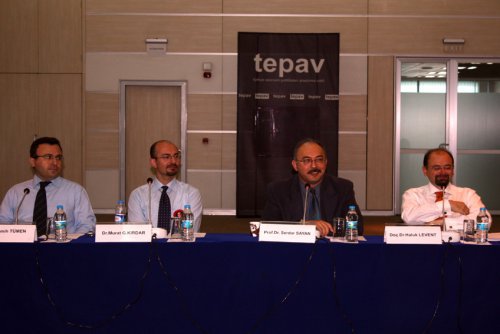The Merih Celasun Award Winner: “The Extension of Compulsory Education Has Reduced the Number of Child Brides.” A study that examines the impact of education on marriage and birth rates reveals that the reform has increased the schooling rates for girls, especially in the rural Turkey.

ANKARA – The extension of compulsory education from five to eight years has increased schooling rates and decreased the number of teenage marriage and births in Turkey. The findings of the TEPAV 2012 Merih Celasun Award winner study, titled “The Effects of Compulsory Schooling Laws on Teenage Marriage and Births in Turkey,” was presented and discussed during a panel meeting at TEPAV on Tuesday, 28 May 2013.
In his opening address, TEPAV Entrepreneurship Institute Director and Awards Jury member Prof. Dr. Serdar Sayan said that all of the articles that had been submitted for the TEPAV 2012 Merih Celasun Award competition had been highly qualified. He said, “All the studies were intriguing and based on creative ideas. The jury members said they had difficulty in deciding the winning study.”
The TEPAV 2012 Merih Celasun Award was presented to the authors of the winner article, Associate Professor Dr. Murat G. Kırdar and Associate Professor Dr. Meltem Dayıoğlu of Middle East Technical University, and Professor Dr. İsmet Koç of Hacettepe University.
During the presentation, co-author Murat Kırdar stated that despite the general increase in the age of first marriage, teenage marriage and birth rates remained at significant levels in Turkey. The study examined the impact of the education reform program implemented in the 1997-98 academic year, which extended compulsory schooling from 5 to 8 years, on marriage and birth behavior by comparing the results for the number of children born before 1987 with that of those born in or after 1987.
Larger impact on girls in rural areas
The most striking finding of the study was that with the reform, the rate of 8th grade completion among females living in urban areas, considered as the most disadvantageous group, increased by almost 40 percentage points, from 20-30 percent to 60 percent. In urban areas, the rates of increase were 18 points for females and 13 points for males. The reform also improved schooling rates at high school level significantly, although the rate of increase was higher for males than females. Kırdar said, “The impact of the reform at high school level was stronger in urban areas. This might be explained by the fact that men feel the need to distinguish themselves via education in order to join the labor force more than women do.”
According to the study, without the reform 7.4 percent of the girls would have married at the age of 16 and 21 percent at the age of 18, while the rates decreased to 4.6 percent and 16.5 percent, respectively, after the reform. Stating that for the cohort above 19, birth rates decreased from 16 percent to 11 percent after the reform, Kırdar said, “The declines in marriage and birth rates were not limited to compulsory education.”
Kırdar said that the new compulsory schooling policy affected teenage marriage rates via the incarceration effect rather than the human capital affect.
Concerns about RPBSs and mobile education
During the discussion, Kırdar talked about the positive impact of regional primary boarding schools and mobile education services on improving schooling rates in urban areas and said that the new 4+4+4 reform in education raised concerns in this respect. He added that they were going to monitor the implementation process in this regard.
“Important for the emancipation of women”
In the discussion session, Assoc. Prof. Dr. Haluk Levent of Galatasaray University and Dr. Semih Tümen of the Central Bank of Turkey discussed the article. Levent said, “The study is of critical importance concerning the emancipation of women. With marriage, women move from their father’s home to their husband’s home. This is a great impediment to the emancipation of women. The impact on human capital is even more critical. It appears that the problem of early marriage in Turkey will be solved, either voluntarily or through the incarceration effect.”
Semih Tümen said, “The study primarily instructs policy-makers. They have to investigate this causality. The researcher dimension of the study puts forth how to measure the impacts of a reform or policy intervention. Another dimension would be to link reforms with micro outputs.” The panel ended after the questions and answer session.
Celasun Family Award goes to another study
Unlike last year, the 2012 Merih Celasun Family Award was given to a second study. The article, titled “Growth and Demography in Turkey: Economic History vs. Pro-Natalist Rhetoric” by M. Aykut Attar of Hacettepe University, won the special Family Award.














